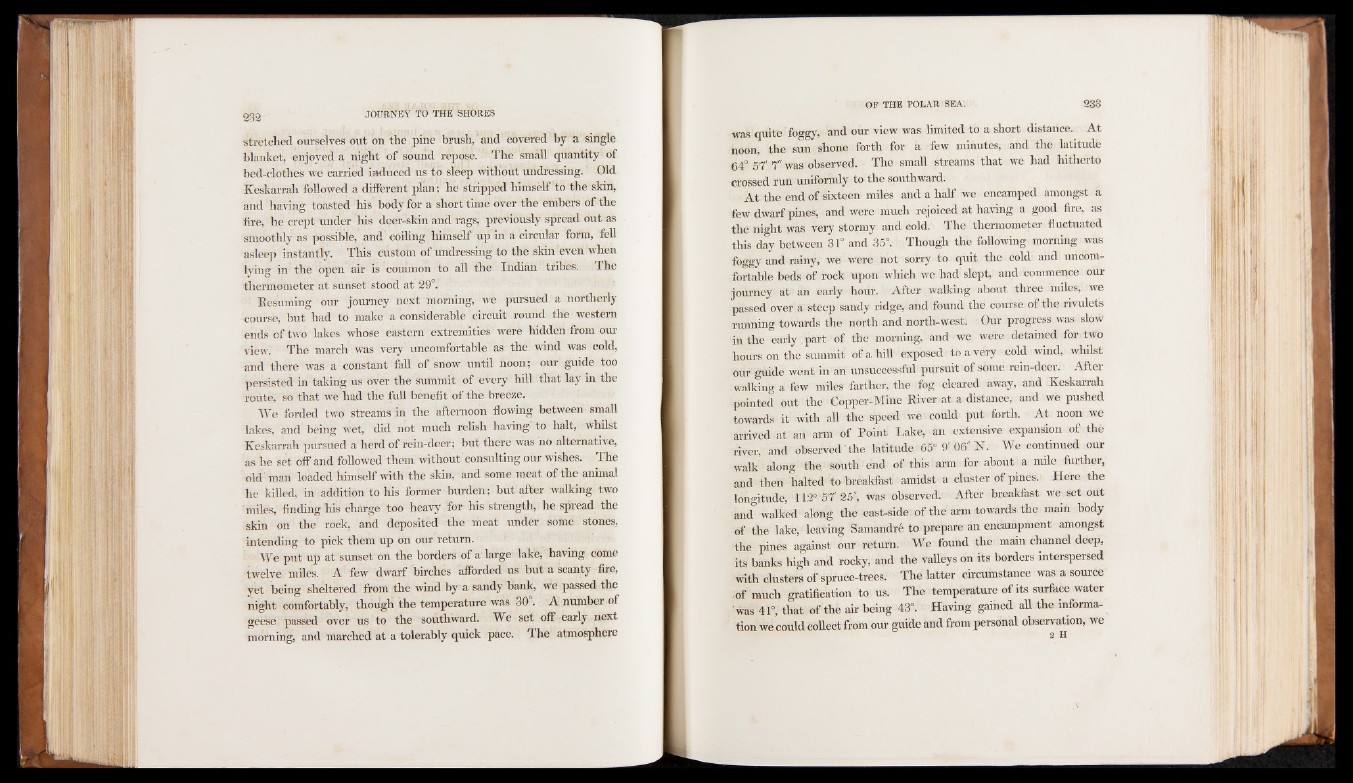
stretched ourselves out on the pine brush, and covered by a single
blanket, enjoyed a night of sound repose. The small quantity of
bed-clothes we carried induced us to sleep without undressing. Old
Keskarrah followed a different plan; he stripped himself to the skin,
and having toasted his body for a short time over the embers of the
fire, he crept under his deer-skin and rags, previously spread out as
smoothly as possible, and coiling himself up in a circular form, fell
asleep instantly. This custom of undressing to the skin even when
lying in the open air is common to all the Indian tribes. The
thermometer at sunset stood at 29°.
Resuming our journey next morning, we pursued a northerly
course, but had to make a considerable circuit round the western
ends of two lakes whose eastern extremities were hidden from our
view. The march was very uncomfortable as the wind was cold,
and there was a constant fall of snow until noon; our guide too
persisted in taking us over the summit of every hill that lay in the
route, so that we had the full benefit of the breeze.
We forded two streams in the afternoon flowing between small
lakes, and being wet, did not much relish having to halt, whilst
Keskarrah pursued a herd of rein-deer; but there was no alternative,
as he set off and followed them without consulting our wishes. The
old man loaded himself with the skin, and some meat of the animal
he killed, in addition to his former burden ; but after walking two
miles, finding his charge too heavy for his strength, he spread the
skin on the rock, and deposited the meat under some stones,
intending to pick them up on our return.
We put up at sunset on the borders of a large lake, having come
twelve miles. A few dwarf birches afforded us but a scanty fire,
yet being sheltered from the wind by a sandy bank, we passed the
night comfortably, though the temperature was 30 . A number of
geese passed over us to the southward. We set off early next
morning, and marched at a tolerably quick pace. The atmosphere
was quite foggy, and our view was limited to a short distance. At
noon, the sun shone forth for a few minutes, and the latitude
64° 57' 7" was observed. The small streams that we had hitherto
crossed run uniformly to the southward.
A t the end of sixteen miles and a half we encamped amongst a
few dwarf pines, and were much rejoiced at having a good fire, as
the night was very stormy and cold. The thermometer fluctuated
this day between 31° and 35°«d Though the following morning was
foggy and rainy, we were not sorry to quit the cold and uncomfortable
beds of rock upon which we had slept, and commence our
journey at an early hour. After walking about three miles, we
passed over a steep sandy ridge, and found the course of the rivulets
running towards the north and north-west. Our progress was slow
in the early part of the morning, and we were detained for two
hours on the summit of a hill exposed to a very cold wind, whilst
our guide went in an unsuccessful pursuit of some rein-deer. After
walking a few miles farther, the fog cleared away, and Keskarrah
pointed out the Copper-Mine River at a distance, and we pushed
towards it with all the speed we could put forth. At noon we
arrived at an arm of Point Lake, an extensive expansion of the
river, and observed the latitude 65? 9!. 06" N . We continued our
walk along the south end of this arm for about a mile further,
and then halted to breakfast amidst a cluster of pines. Here the
longitude;1 112? 57'25", was observed. After breakfast we set out
ancT walked along the east-side of the arm towards the mam body
of the lake, leaving Samandr6 to prepare an encampment amongst
the pines against our return. We found the main channel deep,
its banks high and rocky, and the valleys on its borders interspersed
with clusters of spruce-trees. The latter circumstance was a source
of much gratification to us. The temperature of its surface water
was 41°, that of the air being 43°. Having gained all the information
we could collect from our guide and from personal observation, we 2 H